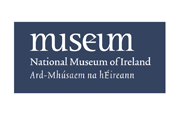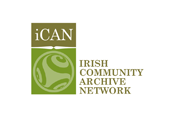I was born March 12, 1895 in a small mountainous village in the wild district of Connemara, County Galway, Ireland. The village had six families, four brothers of one family and two brothers of a different family. They were not related but all their names were McDonough. The village was three miles from a school and five miles from a small town named Oughterard where every body had to go to shop. In Oughterard there were four stores where you could buy most things necessary, a Catholic church, a Protestant church, a police barracks, a court house, six saloons or public houses as they were called, and some other small shops and a railroad station. Oughterard was built on the shore of Lough Corrib which is sixty eight square miles and has 365 islands on it – a good lake for fishing.
During the fishing season fishermen come from Ireland, England, Scotland and some from France. There were only two small hotels in town but there was other available lodging houses. The lake had salmon, trout and perch. There was not much bathing in it because the water is too cold.
Two other families
There were ten children in our family, five boys and five girls. Two other families in our village, Letterfore, had nine children each and one family had only one child. The other family died before I was born. A total of twenty nine children from this village went to Leam National School, but not all at the same time. There was also a poor family named Coyne that also went to school. Most of them emigrated to Pittsburgh, Pa. One boy had a saloon there. He got into politics and his son is now a state senator or congressman.
We all worked as soon as we were able
My mother and father worked hard to support the family. The land was poor. We all worked as soon as we were able. I don’t remember going to bed hungry and I don’t remember every saying I had enough. We had four milk cows, one horse, forty sheep, about three or four other cattle which we tried to fatten for the fairs, two pigs which were fattened to sell, chickens, ducks and geese.
We were poorly dressed, it was difficult to keep clothes on ten children. There was a second hand clothes dealer who traveled from town to town in a large van. He auctioned his wares and sold them cheap. Boys and men could get clothes cheap. My mother could make most of our clothes; she could also make men’s working clothes from a white flannel which was made from sheep’s wool. We sheared the sheep, my mother carded the wool, spun it into thread, sent the thread to a weaver and he hove it into a very good material. She had a pattern, cut the material into shape and sewed it by hand. Most of the farmers wore that kind of clothes when working.
We seldom got an egg
My mother was a very good cook if she had something worthwhile to cook. She made our bread from flour bought in the store. We great some wheat which we took to a mill and ground mixed it with white flour; it made very good bread. Eggs from the chickens were mostly used for buying tea, sugar and sometimes jam. Milk, cream and butter from the cows was never enough for the family needs. We seldom get an egg; only my father could have that luxury. We always had about a dozen young chicken for sale; the fishermen were always eager to buy them. We hatched about a dozen geese. When they were fully grown we killed them for our own use. Ducks eggs we ate ourselves. We raised cabbage, turnips, onions and parsnips which when cooked were good with potatoes. I am telling about the days when I was young. Later on in life the same people had more meat with their meals. The shopkeepers gave credit to the farmers and sooner or later they were paid in full.
My father and mother were both rugged, grateful people. My mother could do almost any kind of work needed on a farm and she did. She was a good housekeeper and a stern disciplinarian. She was boss in the home. My father did not interfere in our chastisement unless it was very serious. I remember once he gave me a good beating because I hit my brother in the face with a stone.
The best worker I ever knew
My mother was in the United States for 6 years before she returned home and got married. My father was tall and rugged. He was the best wrestler in our part of the country and about the best worker I ever knew. After I left school when I was fourteen, I help him work the farm. He did not confide much in me; he talked only where there were instructions. He was a very good conversationalist with grown ups, however. When I was at the railroad station leaving to come to this country, he hugged and kissed me and wept. I am sorry I did not know him better.
My father was a religious man and walked about five miles to church every Sunday. When I was christened, I was taken to a church which belonged to the parish and was about three miles from our house, over some mountains. The parish priest’s name was Father Redmond McDonough – no relation. But he liked my father. My father had carried him across some flooded stream a few times when he was in our village on sick calls. When I was going to be baptized, they must have been talking of something else. Father McDonough blustered out, “Isn’t this child going to have a name?” My father blustered back, “What kind of talk is that? Sure he is going to have a name. Patrick Joseph McDonough.” I was told this story by a friend who was there at the time.
I never saw my father without his full red beard. My mother said he looked better without it. I used to cut his hair even when I was going to school. The nearest barber was twenty miles away. My father was a good shoe repair and a sew leather shoes. He could put on soles and sew leather shoes. I was handy at doing that kind of repair work, too. I learned it from watching my father do it so much. My parents deserve a lot of credit for raising ten children.









Comments about this page
The poor Coyne family that is referenced was my grandmoth, Sarah Coyne who immigrated to San Francisco and married one of the Connolly brothers, Patrick.
Information on poet Patrick McDonough for Annie Coyle Martin
https://thebluenib.com/two-poets-by-kieran-devaney/
That poor Coyne family he references were my Great Grandparents, Patrick and Bridget Coyne. They had 16 children and one son, James Coyne who went on to become a US Senator. One of their grandsons, William Coyne became a US Congressman.
Great story. Patrick and his lovely wife Noreen were the nicest people. My Children adapted them as their grandparents many years ago here in New York. Pat would tell stories about when he first came to America. Having them as friends we considered ourselves very lucky. Some of the places they Loved was New York, Ireland, and Florida. Tom Monahan
I am searching for Patrick McDonough, a poet who wrote: I’ts far I must be going Some night or morning grey Beyond the oceans flowing Beyond the rim of day: And sure it’s not the going But that I find the way. Thank you. Annie
I am searching for Patrick McDonough, a poet who wrote: I’ts far I must be going Some night or morning grey Beyond the oceans flowing Beyond the rim of day: And sure it’s not the going But that I find the way. Thank you. Annie
Add a comment about this page